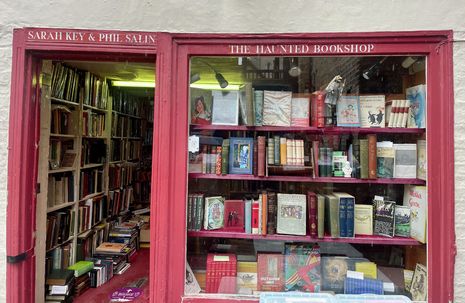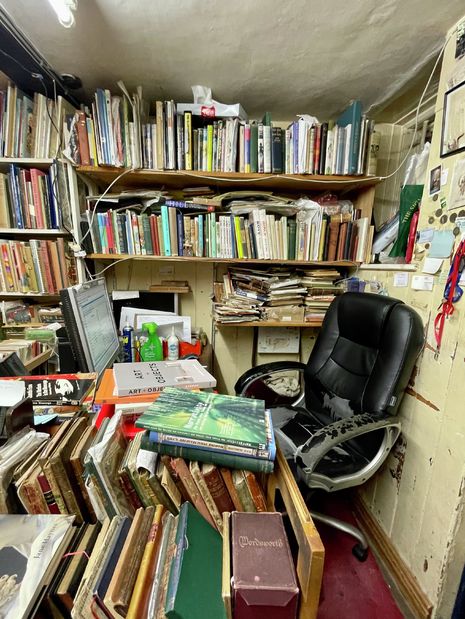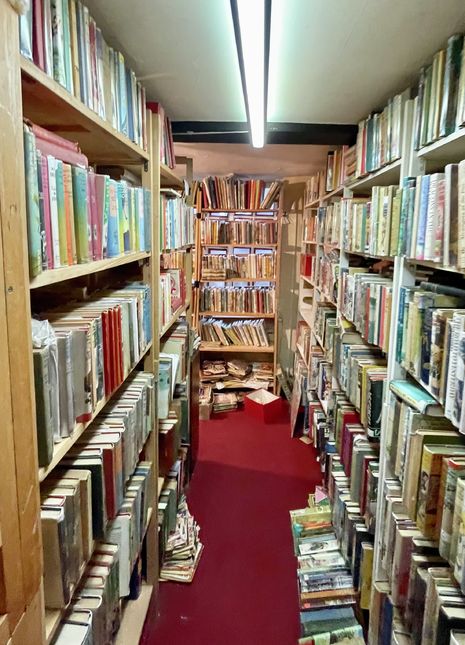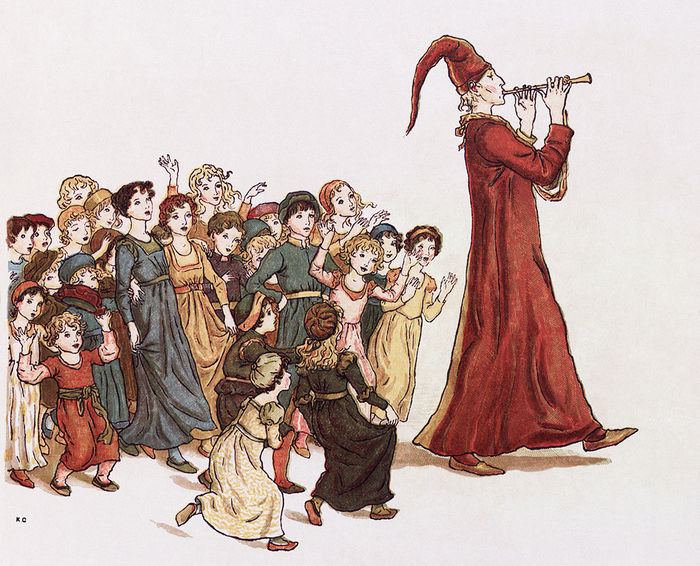The mysteries of the Haunted Bookshop
Laura Potomova explores the spooky secrets behind the seemingly quaint, idyllic bookshop tucked away in St Edward’s Passage, and discusses its otherworldly connections with owner, Phil Salin

Rain falls in torrents from the rim of my umbrella, socks squelch in my tragically un-waterproof shoes. I’m soaked, shivering, and yet, I hesitate outside the door. A witch in faded rags jumps out at me from the window display, her face frozen in an evil cackle. Above her against the blood-red frame of the shop floats the ghostly white namesake of Cambridge’s notorious ‘Haunted Bookshop’
“I step into a world that belongs to the past, a time when Cambridge belonged to Byron, to Plath, to bikes not buses, to newspapers rather than the internet”.
It is the familiar squiggle of Enid Blyton’s name on a book propped near the entrance that finally lures me in. As I cross the threshold, I step into a world that still belongs, somehow, to the past— my past, where I’d sit crossed-legged on my bed, hidden with a flashlight under my covers as the clock struck 12, burying my nose in Famous Five adventures I’d already read a million times before. But also a collective past, a time when Cambridge belonged to Byron, to Plath, to bikes not buses, to newspapers rather than the internet. Rows of second-hand books close in around me, fence me in, they make the room smaller, tighter, but they also blow it open into an endless vista of stories and histories, remnants of years gone by.

As my eyes grow accustomed to the gloom, a desk emerges amidst a pile of books and the head of Phil Salin, the proprietor of the shop, nods at me across a bulky computer-screen. It was his wife, Sarah Key, who started the business in 1987, I later learn, trading in book fairs before her and Phil settled down in the Haunted Bookshop in 1993. But as I probe Phil’s knowledge of the house further, the books momentarily disappear and the rich history of the space itself seeps through the walls, drawing me now into the Red House Pub of the early 1900s, dim lights flickering over clinking beers and male conversations, or old, ghostly student rooms, students complaining of the spookiness of the graveyard outside, or the 1970s record shop Phil so fondly remembers visiting.

I address the elephant in the room. ‘Is the bookshop haunted?’ I ask, curious. The Red House beer-men dissolve into flimsy cling-film apparitions that lean, arms crossed, against the bookshelves or sit on stools of piled books to continue their discussions. I watch as the ghostly old man once spotted by the bookshop’s previous owner rises up from the basement, accompanied by Sarah Key’s white-gowned spectral vision, a faint violet smell lingering behind them as they brush past me and disappear up the stairs.
“I can’t help but sense something shift in the air in response to Phil’s radical dismissal, the ghosts stirring in their graves in outrage at his blasphemy”
But Phil is a rationalist. He shows no sign of fluster and answers my question with dead certainty: ‘People come in expecting to be frightened. But of course, as we all know, there are no such things as ghosts.’ I can’t help but sense something shift in the air in response to Phil’s radical dismissal, the ghosts stirring in their graves in outrage at his blasphemy. Or perhaps it’s just the mixture of disappointment and relief I feel as I listen to Phil debunk the myth of the bookshop’s namesake further: the original owner, Derek Gibbons, ‘got the name from a chap called Christopher Morley,’ a Canadian essayist who had written a book called The Haunted Bookshop.
There is something grounding and admirable in the way Phil takes things as they are, but as I gaze around the walls, each book conjuring in some indirect way its past owner, I wonder if this isn’t just something he tells himself to calm his nerves, to maintain his sanity as he sits hour by hour, day by day, behind his desk, daring the ghosts to stay away.
But if it’s the namesake that lures customers in, it’s the endless promise of the books themselves that makes them return. The discoveries to be made in Phil and Sarah’s bookshop are indeed endless. Far from the clinicality of Waterstones or the unnatural, predetermined order of Amazon, the Haunted Bookshop speaks to the random, the accidental and the aimless in our minds. On the wonky bookshelves, genres overlap, colours blend and time periods collapse. Books rearrange themselves and topple over each other across two storeys, displace one another as new ones glide in and old ones stream out, eyes landing on something new every time you glance around. And as I walk out of the shop an hour later, it seems to me that it is in such moments of serendipity that the magic and mystery of the Haunted Bookshop really lies.
 News / Cambridge academics sign open letter criticising research funding changes22 February 2026
News / Cambridge academics sign open letter criticising research funding changes22 February 2026 News / Supporters protest potential vet school closure22 February 2026
News / Supporters protest potential vet school closure22 February 2026 News / University Council rescinds University Centre membership20 February 2026
News / University Council rescinds University Centre membership20 February 2026 News / Hundreds of Cambridge academics demand vote on fate of vet course20 February 2026
News / Hundreds of Cambridge academics demand vote on fate of vet course20 February 2026 News / Student and union protesters hold ‘Trans Liberation Solidarity Rally’ 24 February 2026
News / Student and union protesters hold ‘Trans Liberation Solidarity Rally’ 24 February 2026










